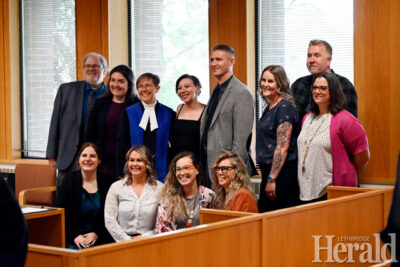Drug treatment court celebrates first female grad
By Lethbridge Herald on June 19, 2024.
 Jasmine Csada (back row, centre) is surrounded by court officials and supporters on Wednesday at the Lethbridge Court House as she celebrated her graduation from the drug treatment court program.
Herald photo by Justin Sibbet
Jasmine Csada (back row, centre) is surrounded by court officials and supporters on Wednesday at the Lethbridge Court House as she celebrated her graduation from the drug treatment court program.
Herald photo by Justin SibbetJustin Sibbet – LETHBRIDGE HERALD – Local Journalism Initiative Reporter
Over the past four years, the drug treatment court in Lethbridge has aimed to help non-violent offenders seek rehabilitation.
The program offers offenders an opportunity to avoid jail and instead work with experts to become clean and clear from drugs.
Since the program opened in 2020, seven people have managed to go through the treatment to completion. On Wednesday, the seventh graduate and first female to complete the program, Jasmine Csada, celebrated with family, friends and support workers at the Lethbridge Court House.
Csada voluntarily chose to take the program, choosing 940 days of treatment instead of 240 days in jail. She said she can easily see how far she has come over the past two and a half years as if she is looking at her old self through a mirror.
“I can still very vividly see that person and I remember who I used to be and the things that I did, but I’m not that person anymore,” said Csada. “I’ve changed and it’s not even something that can be explained, it’s not like an A-B-C. I just function differently now.”
Csada said the drug treatment court offered her a new beginning, something jail could not have done.
“This program has changed everything for me.”
Chelsey De Groot, program manager for the Lethbridge drug treatment court, says this program is not a simple walk in the park for those struggling with addiction.
“Lethbridge drug treatment court is a very difficult program to complete and it’s also difficult to get in, due to our eligibility criteria,” said De Groot.
She said Csada had to go through a lot, but always worked toward the goal of graduation and becoming sober.
“For someone to complete this program and really be meaningfully engaged is a huge accomplishment.”
Despite the accomplishment and relief, Csada admitted it was never an easy journey to get to her graduation.
“It was very intimidating at first,” she said. “I thought it was going to be very easy and simple, but it hasn’t been.”
De Groot noted the program normally takes 18 to 24 months to complete, yet Csada said taking additional time was the right move for herself.
“I think the best thing I ever did for myself in this program was decide to take time,” said Csada. “The program itself offers support in ways I didn’t think were possible.”
Even so, De Groot said it is a rigorous program that offers little wiggle room for those who choose to enter it.
“They do have to call a drug screening line every morning throughout their entire time in the program to see if they’re randomly selected. So, there is a lot of supervision and parameters on these individuals,” said De Groot.
While the program ensures a rigid schedule, the future is wide open for graduates. Csada said this is slightly terrifying, yet it is also a wonderful breath of fresh air which she invites with open arms.
She said she hopes to take some time off before going to school and working in the drug treatment court program herself.
“It changed things so much for me that I want to be able to provide that for other people who are going through the same thing that I went through.”
22-21





Well done! Stand proud for your success!
I had researched similar programs in the US which had high success rates back in 2019 and shared one of the most successful programs with the provincial government back then. That program started by Becky Haas who was hired by the Johnson City, TN police department to put together such a program which would be combined with a the Targeted Community Crime Reduction Program.
As in Alberta, the offender was given a choice for jail or treatment, and the treatment program was 18-24 months.
It started with detox, and a treatment program was developed from an effective PTSD treatment program, modified for addiction treatment and ACE’s, PTSD and other psych issues which were treated in the addiction treatment program treating the cause of the addiction.
Relapse training, upgrading in education and job placement were all part of the program, using volunteer ‘counsellors’ for the recovering addict to meet with after job placement to support them with any issues in the workplace and monitor their recovery. They had the highest success rates, won several awards for the program, which spawned several other successful treatment programs for other mental health issues.
I had the opportunity to communicate with Becky Haas in 2019 and 2020 and I was optimistic when I heard of the pilot project in Edmonton in 2020.
It works and should be expanded in this province!